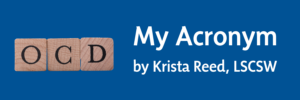
BOSTON – The International OCD Foundation (IOCDF), the leading authority on obsessive compulsive disorder (OCD) and related disorders, is proud to announce a new partnership with World Champion gymnast, best-selling… Read more »

BOSTON – The International OCD Foundation (IOCDF), the leading authority on obsessive compulsive disorder (OCD) and related disorders, is proud to announce a new partnership with World Champion gymnast, best-selling… Read more »
Although past research with twins has shown that genes likely play an important role in the development of dysmorphic concerns, there is still very little understanding of their exact role… Read more »
Research shows that people with body dysmorphic disorder (BDD) may have differences in visual processing that change how they pay attention to things (like focusing on small details) and how… Read more »
Institutional Members are clinics and programs in the US and around the globe that offer residential and/or intensive treatment for OCD and related disorders, are specialty outpatient clinics with a… Read more »
Institutional Members are clinics and programs in the US and around the globe that offer residential and/or intensive treatment for OCD and related disorders, are specialty outpatient clinics with a… Read more »

On October 14th, OCD Kansas hosted one of many OCD Walks taking place across the globe. Over 60 participants came together to connect, share their stories, and make a meaningful… Read more »

By Jennifer Rose It’s no secret that there is a supply-demand crisis going on in America (and perhaps even the world), where there are more people who want to see… Read more »
By Eva Fisher, PhD, Fugen Neziroglu, PhD, ABBP, ABPP, and Jamie Feusner, MD Many people (including therapists and clinicians) have questions about the similarities and differences between eating disorders and… Read more »

Previously, we introduced you to our Research Grant Program, our contribution to advance groundbreaking research into OCD and related disorders. (Please read our Research Grant Fund blog post here.) We… Read more »

Through our initiatives, partnerships, and programs — including the Research Grant Program — the IOCDF is proud to help people with OCD and related disorders globally. With valuable input from… Read more »